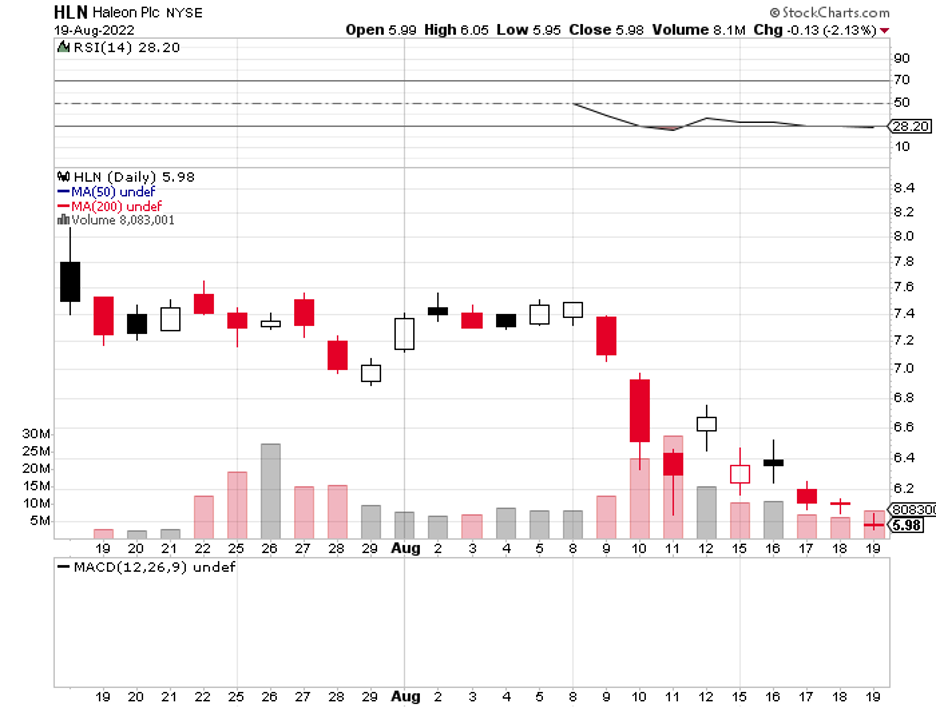A New Kid On The Block
GlaxoSmithKline (GSK) started 2022 by turning down a $60 billion offer from Unilever (UL) for its consumer healthcare division, describing the price as too low.
By June, this same division became a standalone company named Haleon (HLN), with a market value of $29 billion—less than half the amount Unilever wanted to pay.
This means investors looking to buy shares of this spinoff still have a chance to take advantage of the bargain price.
Haleon is so far valued at roughly 13.5 times the consensus average for 2023 earnings, making it a lower multiple compared to competitors selling consumer healthcare items like Unilever, which roughly trades at 17 times its projected 2023 profits, and Procter & Gamble (PG), which trades at about 24 times its estimated earnings.
Compared to Procter and Gamble and Unilever, though, Haleon is a large-cap company that’s considered a pure-play consumer healthcare company.
It started trading as a standalone company by July, with a portfolio that included oral health items such as Aquafresh and Sensodyne, some OTC drugs like Advil and Theraflu, and several supplements including the best-selling multivitamin brand Centrum.
Keep in mind that the majority of Haleon’s core products have been practically unchanged for years. This spinoff only allotted roughly $300 million for R&D in 2021.
That comprises a mere 2.7% of its turnover. Meanwhile, GSK spent over 20% of its turnover on R&D initiatives within the same period excluding Haleon.
So far, the only notable pure-play consumer healthcare competitors are Perrigo (PRGO) and Prestige Consumer Healthcare (PBH). However, these two operate at a far smaller scale, with market capitalizations of less than $6 billion.
The absence of a competitive peer group and the limited track record of Haleon as a solo company makes this GSK spinoff more speculative compared to other consumer healthcare firms.
Haleon’s future would become clearer by the end of 2022, with more earnings reports under its belt, alongside the completed deal with Johnson & Johnson (JNJ).
JNJ also plans to create a standalone company for its consumer healthcare division in 2023. Haleon will be combined with this particular spinoff to form a new category.
Based on its current portfolio, brand recognition, and years of experience under Big Pharma’s, Haleon is projected to grow by 3.3% annually from 2023 through 2026.
At this point, Haleon is already considered a dominant player in the field. In the 2021 earnings report, this division brought $11.5 billion to GSK. That’s lower than JNJ’s own consumer healthcare division, which raked in $14.6 billion, but higher than Procter & Gamble’s $10 billion.
A standalone consumer healthcare company has the capacity to attract additional investor attention and gain higher valuations for those looking for steady—albeit not jaw-dropping—growth while earning consistent income from dividends.
Haleon announced that it intends to start paying out in the first half of 2023 “at the lower end” of the 30% to 50% range of its earnings. Looking at the company’s recent price, its 2023 dividend yield is estimated to be at 2.3%.
The consumer healthcare sector is a lucrative segment. The size of this market is estimated to reach $301.4 billion by 2027, with a 7.2% growth in CAGR throughout that period.
The demand for products in this segment tends to be unaffected by economic issues like recessions. Moreover, established brands, particularly those under Big Pharma names like JNJ and GSK, can easily set a very high barrier for competitors to overcome.
Overall, Haleon presents an opportunity for investors to bag a bargain.
It has a solid lineup of strong brands, which have shown their capacity to drum up consistent sales and demand low R&D expenses. These factors make Haleon a potential cash cow that could steadily deliver rising dividends for years to come.
Haleon is a good bet on an excellent emerging market—not to mention a virtually recession-proof—market.


